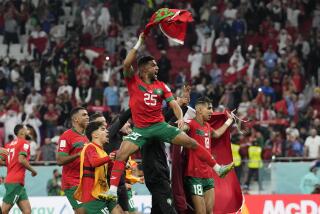South Africa to Stage Soccer World Cup
- Share via
Robben Island is a speck of land in Table Bay off the coast of Cape Town, South Africa.
For 27 years, this bleak spot was the enforced home of Nelson Mandela, the future South African president and future Nobel Peace Prize winner who, along with key supporters, was imprisoned there by South Africa’s apartheid regime.
Mandela, 85, had reason to reflect back on those lost years Saturday when he and 44 million fellow South Africans joyously celebrated their victory in the race to stage soccer’s World Cup in 2010.
South Africa defeated its closest rival, Morocco, 14-10, in a vote by the executive committee of FIFA, which is world soccer’s governing body, in Zurich, Switzerland.
The day before, Mandela had made an impassioned speech to members of the executive committee, pleading the case for his country to become the first nation in Africa to hold the sport’s quadrennial world championship.
“It is 28 years since FIFA took its stand against racially divided football and helped inspire the final story against apartheid,” Mandela said.
“While we were on Robben Island, the only access to the World Cup was on radio. Football was the only joy to prisoners.
“As I stand before you as part of the South African delegation, I can confirm that we are ready, determined, willing and capable, as well as passionate, about hosting the World Cup.
“You, my friends, have it in your hands to make that dream a reality. As football generated hope on Robben Island, hosting this World Cup will give a certain meaning to this hope.”
FIFA’s leaders agreed. On Saturday morning, they awarded the sport’s showcase event to South Africa on the first ballot.
Three other candidates received no votes. Tunisia withdrew from the race Friday when FIFA refused it permission to share the tournament with Libya. On Saturday, FIFA rejected Libya’s bid as failing to meet “relevant conditions,” and Egypt, to its astonishment, garnered no support at all.
“I feel like a young man of 50,” Mandela, draped in a South African flag, said as the outcome was announced at Zurich’s World Trade Centre and supporters chanted “Madiba, Madiba,” Mandela’s tribal name.
Danny Jordaan, who led South Africa’s bid, was equally ecstatic.
“FIFA have found Africa worthy after 100 years,” he said. “It’s wonderful to be an African and to feel world class.”
The 2010 World Cup is expected to generate more than 150,000 jobs in South Africa, which is racked by high unemployment, poverty, crime and AIDS, and to add upward of $430 million to the nation’s economy.
News of the victory was greeted by cheering crowds across the country, from cities such as Cape Town, Durban and Johannesburg to such townships as Soweto, once the scene of so much agony during the apartheid era.
“We thought freedom in our lifetime was a dream,” said Nomaindia Mfeketo, the mayor of Cape Town. “That dream is a reality now, and hosting the World Cup is a reality.”
In Pretoria, South African President Thabo Mbeki toasted the decision with a glass of champagne, saying, “FIFA made the right decision. Let’s all go out and celebrate.”
The FIFA decision was not unexpected, especially because South Africa had proved its capability by successfully holding the rugby world championship in 1995 and the cricket world championship in 2003.
It had the best infrastructure of any of the candidates, the best communication and transportation systems and already has nine stadiums in place.
Saturday’s vote also expunged the sorrow of four years ago, when South Africa lost by a single, controversial vote to Germany in its bid to stage the 2006 World Cup.
Reaction among the losing nations was more or less predictable.
In Cairo, Adly al-Qaei, general secretary of the Egyptian soccer federation, was nonplused.
“I can’t comprehend what’s happened,” he said. “I never felt that our chances were very great, but I never imagined that we wouldn’t get a single vote. We had all the capabilities to organize the tournament, but we couldn’t convince a single member.”
Ihab Shalaby, a member of Egypt’s bid committee, said “politics and emotions” won for South Africa, pointing out the effect that Mandela’s words had had on executive committee members.
Libyan leader Moammar Kadafi congratulated South Africa, but the country’s newspapers bitterly attacked FIFA even before the vote’s outcome was announced.
The daily Al-Zahf al-Akhdar, in a strongly worded editorial, described FIFA as “a myth and a nightmare that the world is living in for a century now. It is a frontier gang that controls the destinies of nations.”
The decision to oust Libya on Saturday apparently stemmed from Libya’s refusal to allow entry into the country -- even during the World Cup -- to fans from nations it boycotts, specifically, Israel.
Morocco, which was also a losing bidder in 1994, 1998 and 2006, was much more restrained in its response.
“There is absolutely no disappointment,” Saad Kettani, chief of Morocco’s bid committee, said. “We salute our African brothers for their success.... It will be a World Cup for the whole African continent.”
In an oblique but unelaborated reference to the politics that always surround the World Cup vote, Kettani said that the reasons for Morocco’s failure to win the event were not entrenched in the bid itself.
“There were no objective disadvantages to our bid,” he said. “Therefore, you have to look for them elsewhere.”
Alan Rothenberg, the Los Angeles lawyer and former president of U.S. Soccer who had served as a consultant to Morocco, had suggested beforehand that Mandela would not influence the vote.
“Everyone on the executive committee knows who Mandela is and what he has said and done and achieved,” Rothenberg said Friday.
“We all appreciate him and his place in history, but that is it -- Mandela is not a man of the future. He is a man of history.”
Perhaps so, but Mandela on Saturday gave his country a future to look forward to, one that even he might never have imagined during those long years on Robben Island.
*
Times wire services contributed to this report.
*
(Begin Text of Infobox)
Africa Bound
*
The awarding of the 2010 World Cup to South Africa continued FIFA’s efforts to take the event beyond Europe and South America, where 13 of the first 14 Cups were scheduled. The Cup hosts:
*--* 1930 Uruguay 1978 Argentina 1934 Italy 1982 Spain 1938 France 1986 Mexico * 1950 Brazil 1990 Italy 1954 Switzerland 1994 United States 1958 Sweden 1998 France 1962 Chile 2002 Japan/South Korea 1966 England 2006 Germany 1970 Mexico 2010 South Africa 1974 West Germany
*--*
* Originally awarded to Colombia, which withdrew because of financial difficulties.
Note -- Not held in 1942 and ’46 because of World War II
More to Read
Go beyond the scoreboard
Get the latest on L.A.'s teams in the daily Sports Report newsletter.
You may occasionally receive promotional content from the Los Angeles Times.






